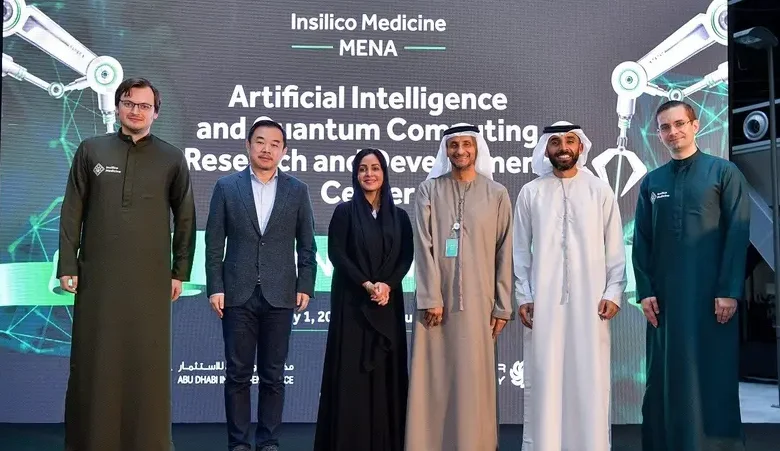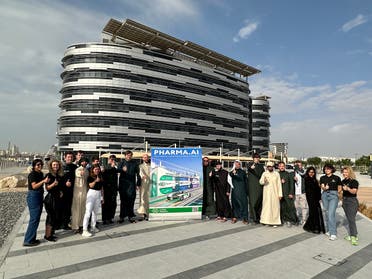Abu Dhabi-based lab pioneers AI-driven drug solutions for rare diseases, aging

An Abu Dhabi- based company is developing new drug solutions for cancer, COVID-19, and rare diseases using Generative AI.
Founded in Hong Kong, Insilico Medicine, a clinical-stage artificial intelligence (AI)-driven drug discovery company, opened the largest AI-powered biotech R&D center in the UAE’s capital in February.
The Insilico Medicine Generative Artificial Intelligence and Quantum Computing Research and Development Center is located the International Renewable Energy Agency (IRENA) headquarters in Masdar City.
Insilico’s generative AI technology platform called Pharma.AI has been validated through several drug candidates – including two for idiopathic pulmonary fibrosis and COVID-19, currently in human clinical trials.
Idiopathic pulmonary fibrosis (IPF) is a severe chronic (long-term) disease that affects the tissue surrounding the air sacs, or alveoli, in your lungs. Over time, these changes can cause permanent lung scarring, called fibrosis, making it progressively more difficult to breathe. There is no cure for IPF, according to the National Heart, Lung, and Blood Institute in Bethesda, Maryland, US.
Insilico has also incorporated other tech breakthroughs into the Pharma.AI platform, including robotics and AlphaFold2 deep learning system for protein structure prediction.

In exclusive comments to Al Arabiya English, Dr. Alex Aliper, Insilico Medicine’s Co-Founder and President, discussed his views on the rise of the generative AI industry in the Middle East, opportunities for extending this technology to other spaces – such as sustainable fuels, where they have a partnership with Saudi Aramco, and more specifically on advances in AI drug discovery.
Aliper has pioneered the application of AI for drug discovery and drug repurposing, generative chemistry, and generative biology and put an AI-designed drug into human clinical trials. He built a team of over 100 AI engineers that developed state-of-the-art software products for target discovery, small molecule generation, and clinical trial outcome prediction.
“Generative AI is being adopted in nearly every industry and provides an opportunity for the Middle East to quickly scale up and become a player in the biotech industry,” Aliper said, giving a bird’s eye view of the rise of the generative AI industry globally and in the Middle East.
“While the Middle East does not have a record of pharmaceutical drug discovery and development, it does have extensive scientific and technological expertise, as well as partnership opportunities across government and academia,” he said.
UAE’s AI-driven economy
Regarding Insilico’s move to place its R&D center in Abu Dhabi, he said: “We chose this location for a number of reasons: as mentioned previously, we are excited by the tech talent and government commitment to expanding an AI-driven economy in the UAE. The prime location, strong and stable economy, developed infrastructure and highly educated talent make Abu Dhabi an attractive place to continue to develop our technology capabilities. And we have close partnerships with academic and business partners who are working alongside us to explore the use of AI for sustainable fuels and materials as well as the digital transformation of healthcare.”

In its primary focus area of health and AI drug discovery, Insilico Medicine has made many advances “utilizing generative artificial intelligence to understand the mechanisms behind many different diseases as well as aging to discover new molecular targets and pathways implicated in these diseases, and then ‘imagine’ new molecules that can become successful drug candidates.”
Aliper said Insilico Medicine had released several AI software tools – including PandaOmics (generative AI for target discovery), Chemistry42 (generative AI for drug design), and InClinico (generative AI for clinical trial outcome prediction) – collectively called Pharma.AI, that are now used by many academics, pharma, and biotechnology companies.
“Using generative AI and aging research, we identified promising molecular targets for a range of diseases and aging. We developed compounds using our generative chemistry platform, Chemistry42, which can generate compounds with desired properties without the need to search molecular libraries. Just like ChatGPT can take input parameters and produce generated output, our platform can turn scientists’ directions for molecules with specific characteristics into brand new drug candidates that can then be synthesized and developed into new treatments for disease.”

Insilico Medicine’s lead drug candidate for idiopathic pulmonary fibrosis (IPF) “is on track to be in Phase 2 clinical trials with patients this year.”
“We have another AI-designed drug for COVID-19 that’s also in clinical trials and 31 drugs advancing in our pipeline, including many for cancer as well as fibrosis and chronic kidney disease,” he said.
Developing sustainable chemicals, fuels
Insilico’s generative AI platform can be used not only to develop new chemicals to treat disease but also to develop more sustainable chemicals, fuels, and materials.
In 2021, the company partnered with Syngenta to accelerate and invent more sustainable crop protection solutions.”
“In the MENA region, we are working with companies including Aramco to develop sustainable fuels and materials – to both minimize emissions and maximize efficiency – and with Luberef, to improve the sustainability and longevity of base oils and lubricants,” Aliper said.
Partnership with Saudi Aramco
In February, the company signed its agreement with Saudi Aramco to develop sustainable fuels and improve the longevity of materials. It was announced during the LEAP tech conference in Riyadh.
“The partnership follows a series of pilot studies proposed by Aramco scientists, in which Insilico used the company’s generative AI Chemistry42 platform to design new molecules for fuel and materials science applications, and to generate novel molecular structures optimized for specific properties,” Aliper told Al Arabiya English.
Ultimately, we believe that AI has a major role to play in fighting climate change, and we are eager for our platform to be part of the solution,” he added.
Extending human longevity
Another aspect of the work at Insilico Medicine is that its most prominent goal is extending healthy, productive human longevity – and that “underscores all of our individual efforts, from using AI to understand the mechanisms behind aging and disease, to developing dual-purposes therapeutics, to accelerating the speed and efficiency of drug development, to contributing to the development of more sustainable fuels and materials.”










